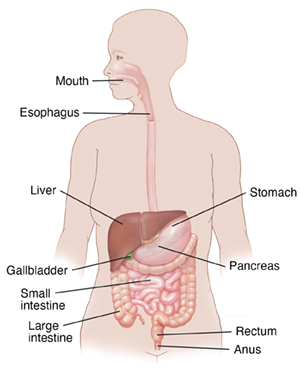What is digestion?
Food and drink must be changed into smaller molecules of nutrients to be absorbed into the blood and carried to cells throughout the body. Digestion is the process of breaking down food and drink into smaller parts so that the body can use them to build and nourish cells, and to provide energy.
What makes up the digestive system?

The digestive tract is a series of organs joined in a long, twisting tube from the mouth to the anus. It consists of:
-
Mouth
-
Esophagus
-
Stomach
-
Small intestine
-
Large intestine
-
Rectum
-
Anus
Organs that help with digestion but are not part of the digestive tract include:
Parts of other organ systems, such as nerves and blood, also play a major role in the digestive process.
What changes occur in the digestive system during pregnancy?
Pregnancy hormones can affect the digestive system. The hormone progesterone, which causes smooth muscle relaxation, often causes relaxation and slowing of digestion in the stomach and the small and large intestines. The gallbladder is also affected with delayed emptying. That can increase the chances of gallstone formation. Many of the digestive discomforts of pregnancy, such as morning sickness (nausea or vomiting), constipation, and heartburn, are all related to the relaxed tone and slowed action of the digestive system.
The growing uterus itself can affect the digestive system. As the uterus grows, it can press on or even block parts of the digestive tract. This can lead to slowed movement of food and constipation. Increasing fluids, regular exercise, and increasing the fiber in your diet are some of the ways to prevent constipation. Always ask your doctor before taking any medicine for this condition.
Many women have appetite changes in pregnancy, such as:
-
Increased hunger
-
Decreased appetite
-
Cravings
-
Aversions
-
Nausea and vomiting
A few women develop pica, a rare craving to eat things other than food. This includes things like dirt, clay, ice, raw rice, flour, starch, or coal. The craving may mean there is a nutritional deficiency, such as not enough iron in the body.